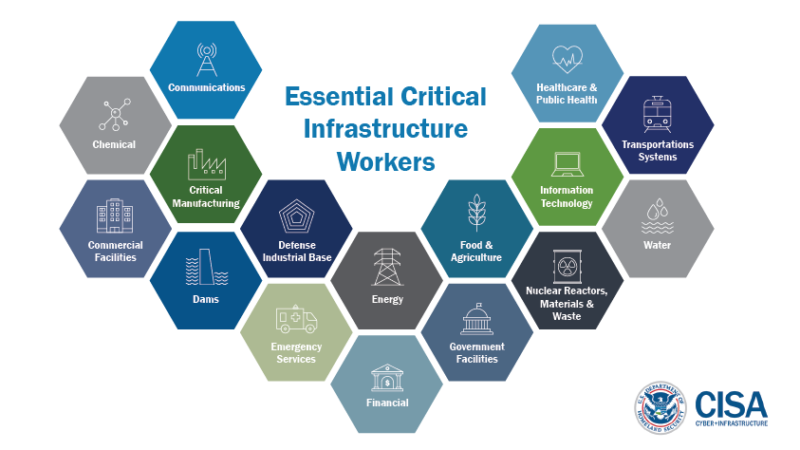A flurry of development and directives have emerged in the last week to provide guidance and increased flexibility as Federal workers look to fulfill, and at times adapt, their agency mission in the face of the unprecedented COVID-19 crisis. Here is an overview of the most recent developments. This page will update as the situation changes, and Gordian will continue to look and listen for ways to support our Federal clients.
Wednesday, March 25, 2020: The US Army Corps of Engineers Releases Plan for Rapid Facilities Conversion
Fresh off the heels of the Friday press conference, the U.S. Army Corps of Engineers (USACE) releases an athletic but robust guidance for the transformation of various facilities (hotels, dormitories, arenas and convention centers) into patient care facilities, both for COVID-19 patients and non-COVID-19 patients. The guidance includes schematic diagrams, a Statement of Work, and specifications for each scenario. It also includes guidance on site selection and provision for “wrap-around services” to provide for a turnkey facility.
The Cost Engineers at Gordian have reviewed the Scope of Work, including:
- Removing carpeting.
- Installing vinyl flooring or epoxy.
- Revising HVAC ducting and HEPA filtering.
- Adding Emergency Backup Power and Uninterrupted Power Supplies
- Adding additional electrical outlets.
- Adding privacy curtains.
- Site Improvement items as needed: Perimeter fencing, Patient screening area, Exterior pharmacy, Medical Gas Storage, Access Control Point, Medical waste disposal area.
All work is funded by FEMA. State and local governments will be given the option of executing the work themselves where they have appropriate contract vehicles at the ready. USACE is available to support those that may not have the contract or management resources to execute the work.
One potential risk identified and addressed by USACE is the use of Cost Contracts, which are fraught with management oversight requirements and have the potential for abuse. USACE districts and state and local governments that have IDIQ options like Job Order Contracting to provide pricing control and auditability will want to use those contracts. Of course, having the right cost data to reflect the unique scope of work is critical. Gordian’s cost engineers have been reviewing the required line items and have verified that our healthcare-specific Construction Task Catalog® (CTC) includes most of the required line items. These line items can be added to pre-existing Job Order Contracts by addendum, and can be rapidly deployed to support IDIQ contract procurement and governance for this important work.
Many governments, and even USACE Districts, may also need personnel support for rapid scoping and pricing of the work. Gordian’s 300+ strong workforce across the country provide turnkey support of hundreds of JOC programs designed for this type of emergency response execution. Gordian is ready to serve in addressing the facility transformation needs of the COVID-19 crisis.

Sunday, March 22: OMB Issues Additional Direction on Leveraging Technology
The Office of Management and Budget (OMB) continues to nudge agencies forward by acknowledging that “in some situations, although technical capabilities are available, agency business processes have not evolved to fully utilize these expanded capabilities. By aggressively embracing technology to support business processes, the Federal Government is better positioned to maintain the safety and well-being of the Federal workforce and the American public while supporting the continued delivery of vital mission services.”
OMB recognizes that this includes “increasing the number of licenses available, leveraging services and technologies across the enterprise, and directing specific activities to be conducted via collaboration forums.”
In addition, while reinforcing the importance of cyber security requirements, agencies “are encouraged to make risk-based decisions as appropriate to meet mission needs.”
Many Federal agencies, such as the Defense Logistics Agency and FEMA, have completed risk assessments for RSMeans Data Online and other Gordian Cloud programs and issued an Authority to Operate (ATO) based on the low risk-profile of information stored, the use of Microsoft Azure’s highly-secure cloud infrastructure and the ongoing work in hardening the systems to FedRAMP standards.
Friday, March 20: USACE Holds a Press Conference on its Leadership in Transforming Facilities to Treat COVID-19 Patients
General Todd Semonite takes charge of the situation. The U.S. Army Corps of Engineers (USACE) and the Federal Emergency Management Agency (FEMA) have been called to support rapid facilities transformation in order to accommodate the imminent surge of COVID-19 patients. These patients require more critical care beds than are currently available in our healthcare system. Efficient quantification of scope and costs for this work will be critical.
FEMA already uses Gordian’s scalable, cloud-based RSMeans Data Online platform to quantify and validate construction costs for disaster recovery. USACE and FEMA will need a common platform with cost data specific to healthcare renovation tasks to rapidly scale the program across the country. IDIQ contracts have long been leveraged by USACE for this type of urgent, repetitive work, but USACE should look to how leading healthcare systems have enhanced IDIQ programs like Job Order Contracting and SATOC with healthcare-specific cost data and collaborative workflow tools that expedite delivery.
Friday, March 20: Department of Defense Issues a Memo on Critical Infrastructure Workforce
According to the memo, the Critical Infrastructure workforce includes:
- Workers who support the operation, inspection and maintenance of essential public works facilities and operations, construction of critical or strategic infrastructure and other emergent issues.
- Those involved in the construction and maintenance of key categories of infrastructure including Water and Wastewater, Transportation and Logistics, Healthcare Facilities, etc.
Gordian moved quickly to protect its workforce and participate in the communal responsibility to flatten the COVID-19 curve by mandating remote work and prohibiting non-essential airline travel. However, we recognize that our support of facility operations and rapid transformation can fall under these Critical Infrastructure categories, and we stand ready to serve alongside our Federal agency customers as we confront this crisis.
Friday, March 20: OMB Provides Guidance on Facilities Activities and Stafford Act Authorities
OMB delivers robust guidance and answers questions regarding procurement flexibility to adapt to changing circumstances and shifting priorities. Clearly, this administration is looking to cut through the complex processes that can slow down Federal procurement. OMB directs agencies to “consider whether contracts that possess capabilities for addressing impending requirements such as security, logistics, or other function, may be retooled for pandemic response consistent with the scope of the contract.” FEMA followed similar guidance to retool its RSMeans Data Online contract in 2018. In response to unprecedented disasters, the agency modified the contract to provide for the development of post-disaster cost data for Puerto Rico and the U.S. Virgin Islands.
OMB also encourages agencies to leverage the special emergency procurement authorities authorized in connection with the President’s emergency declaration under the Stafford Act, which increases the following procurement thresholds:
- The micro-purchase threshold is raised from $10,0001 to $20,000 for domestic purchases and to $30,000 for purchases outside the U.S.
- The simplified acquisition threshold is raised from $250,0002 to $750,000 for domestic purchases and $1.5 million for purchases outside the U.S.
- Agencies may use simplified acquisition procedures up to $13 million for purchases of commercial items.
These authorities are designed to provide increased flexibility to agencies as well as “reducing friction for contractors.” The memo also states that, because this is a pandemic affecting all corners of the nation, the usual requirements around preferences for local businesses do not apply.
Interestingly, this memo specifically addresses the issue of construction and renovation projects:
“If a Federal building, such as a museum, is closed to the general public in order to further the practice of social distancing, should repair work to the building be halted until the building is reopened? Whether work is continued or stopped should be addressed on a case-by-case basis, taking into consideration the health and safety of government and contractor employees. These discussions should include consideration of guidance from CDC and local public health officials to determine if there is a risk-based reason to stop work and, if work continues, steps that might need to be taken to address the health and safety of workers.”
There may be a case for focusing on the continuation of this work with certain modifications if the work is in alignment with the agency’s mission and priorities. Work in occupied facilities always presents safety concerns, which entail certain costs to mitigate. Where work can continue under reasonable social distancing requirements (approaches such as staggered work schedules can help make this possible), it may be advantageous to execute this work while facilities are unoccupied. Some colleges and universities are taking this approach by starting construction work normally reserved for the summer months when fewer people are on campus. In addition, facilities may deploy contractors to upgrade HVAC or other environmental systems and to provide biohazard cleaning.
Other agencies may elect to defer construction work, but they will need tools to rapidly address backlog once the requirement for stringent social distancing is loosened. Job Order Contracting and the right cost data are valuable tools for flexibility and addressing work surges.
In summary, OMB urges that “clear and timely communication between agencies and their industry partners is critical to supporting the government’s response to COVID-19 and to meeting other mission needs during this highly dynamic situation.”
Tuesday, March 17: OMB Issues Additional Guidance on Adapting Mission and Streamlining Approval Processes
OMB delivers additional guidance on Tuesday, in recognition of the necessity of prioritizing mission-critical activities and providing added flexibility for agencies at this time. OMB directs agencies to “consider streamlining regulations and approval processes for critical services,” which should allow for the rapid acquisition or substitution of technologies that support telework.
Sunday, March 15: OMB Issues Guidance on Increased Telework for Federal Workers and Contractors amid COVID-19
In the wake of mandates for social distancing during the COVID-19 outbreak, OMB encourages “agencies to use all existing authorities to offer telework to additional employees, to the extent their work could be telework enabled.” Of course, while some agencies already have teleworked protocols in place, others — especially the DoD — are still location-based. These agencies are scrambling to ensure their workers have access to necessary technology and software.
We heard from many of our Federal customers this week, seeking options to their on-premises estimating software. There is significant work involved in installing software on laptops, so the preference has been for an online option. Fortunately, Gordian has been working on cloud-enabled, next-generation solutions to both our estimating and procurement support products for several years. We have been able to respond with immediate enablement of alternative tools, with nothing to install and no burden on IT staff.






